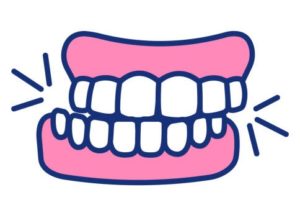What Is the Cause of Teeth Grinding, and How Can It Be Treated?
 Teeth grinding or bruxism is a repetitive movement disorder where a person routinely grinds, gnashes, or clenches their teeth with their jaw muscles. This can involve the front teeth or all of the teeth and can include symptoms like headaches, facial pain, and temporomandibular joint disorder.
Teeth grinding or bruxism is a repetitive movement disorder where a person routinely grinds, gnashes, or clenches their teeth with their jaw muscles. This can involve the front teeth or all of the teeth and can include symptoms like headaches, facial pain, and temporomandibular joint disorder.
Certain medications can increase the risk of bruxism, so a prescription change can solve this problem. However, other people need more help, like taking measures to relieve stress (since many people grind their teeth when they are stressed) or wearing a mouthguard when they sleep.
Two Types of Teeth Grinding
- Awake bruxism. Otherwise known as diurnal bruxism, this happens when people are awake. The symptoms get worse as the day progresses. This type of bruxism is more common among women.
- Sleep bruxism. Also called nocturnal bruxism, this happens during the night. The symptoms are usually worse when the person first wakes up.
Causes and Risk Factors of Teeth Grinding
There are several reasons why a person will grind their teeth. There are also lots of factors that can increase a person’s risk of having or developing bruxism. These include:
- Age: Kids are more likely to grind their teeth. Sleep-related bruxism affects 15 to 40 percent of children, while it only affects 8 to 10 percent of adults.
- Genetics: Bruxism tends to run in families. Children are about twice more likely to have it if a parent had the condition.
- Emotions: Anxiety, stress, tension, suppressed anger and frustration are potential culprits of teeth grinding.
- Medication: Research has shown that certain medications can cause bruxism, including medicines that treat psychiatric conditions. It is believed that these drugs cause changes in the nervous system that can lead to jaw clenching and teeth grinding. Examples include antidepressants and antipsychotics, particularly selective serotonin reuptake inhibitors.
- Personality. Teeth grinding is associated with certain personality traits such as neuroticism.
- Substance abuse. Cigarette smoking, alcohol, caffeine, and recreational drug use can increase the risk for bruxism.
- Medical conditions. Bruxism is associated with certain medical conditions like ADHD, dementia, GERD, epilepsy, sleep apnea, night terrors, and Parkinson’s disease.
Treatment Options for Teeth Grinding
Teeth grinding is very treatable. The first step in ensuring a successful treatment is to determine the exact cause of the grinding. From here, you will then target your treatment to this specific cause.
- Therapy: If chronic anxiety or stress is making you grind your teeth, it might help to see a therapist. After dealing with the issues that cause you emotional distress, bruxism can be abated. Counseling can also help with relaxing techniques and sleep habit modification. If all other efforts fail, biofeedback might be worth trying.
- Mouthguards and splint therapy: For night grinders, a mouthguard can be helpful. Some guards fit over the top while, while some fit over the bottom teeth. They keep your jaw in a relaxed position to give some other function.
- Medications: There are lots of medications that have been tried for teeth grinding, but data on their efficacy is still limited. However, there is evidence that certain drugs can help manage it. Muscle relaxants and Botox injections have shown some promise in temporary cures for bruxism when it is not caused by an underlying condition or medication.
Prolonged teeth grinding can lead to temporomandibular joint disorder, as well as prolonged pain in the jaw, face, and neck, and even long-term damage to the teeth. If you think that you are grinding your teeth or clenching your jaw, see a dentist or medical professional as soon as you can so proper interventions can be provided.





 |
|